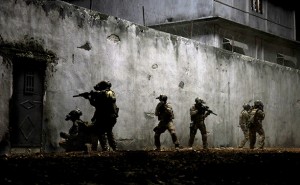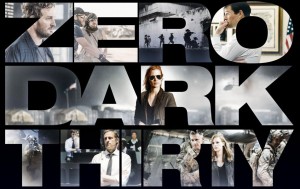ZERO DARK THIRTY: 4 STARS
 Alfred Hitchcock famously described how to create tension in a movie. “There’s two people having breakfast and there’s a bomb under the table,” he said. “If it explodes, that’s a surprise. But if it doesn’t…” I’ll finish the sentence he so anticipatorily left undone: “…that’s suspense.”
Alfred Hitchcock famously described how to create tension in a movie. “There’s two people having breakfast and there’s a bomb under the table,” he said. “If it explodes, that’s a surprise. But if it doesn’t…” I’ll finish the sentence he so anticipatorily left undone: “…that’s suspense.”
“Zero Dark Thirty” (refers to the military time for thirty minutes after midnight) operates on this premise, creating suspense even though many of the bombs do go off and we know how the story ends. The whole movie is the bomb under the table, leading up to an explosive, although protracted, climax.
The film begins on 9/11 with audio of calls coming from the Twin Towers. Stage set, the movie leaps forward two years to the brutal waterboarding and torture of an Osama bin Laden relative by Dan (Jason Clarke) a CIA expert in extracting information. “In the end everybody breaks,” he tells his subject. “It’s biology.” Overseeing the waterboarding and humiliation techniques is Maya (Jessica Chastain), a newly recruited officer charged with helping to track down terrorist leader bin Laden and dismantle al-Qaeda.
This is Maya’s story. It’s a carefully plotted espionage tale that flows from the clues that lead to the death of bin Laden at the hands of the Navy S.E.A.L. Team 6 in May, 2011.
“Zero Dark Thirty” is not a who dunnit, or why dunnit, but a how dunnit.
It’s a detailed look at the step-by-step process that resulted in locating and exterminating bin Laden. The story begins before President Obama’s famous, “We don’t torture,” speech about regaining “America’s moral stature in the world,” so it presents the uncomfortable, controversial truth that pitiless persuasion like sleep deprivation, boxing and waterboarding—so simple, yet so brutally, terrifyingly effective—was used to gain information.
That queasy feeling from the film’s opening torture scene–that unethical techniques were used to gain information—evaporates during the daring Abbottabad raid sequence. While there’s a political discussion to be had regarding the ethics of waterboarding, that’s for another column. Dramatically it helps to provide a starting place for what is essentially a procedural.
Director Kathryn Bigelow and journalist-turned-screenwriter Mark Boal have focused on the details, shying away from delving into the personal lives of the characters.
Chastain’s Maya is a cipher, we know little about her except she was recruited out of school by the CIA and has spent a decade chasing one goal. Her selfless, obsessive dedication has perhaps cost some of her humanity, but Chastain manages to create an interesting character even when she has to mouth hyperbole about her noble quest. “A lot of my friends have died,” she says. “I believe I was spared so I could finish the job.” That’s a line straight out of any generic action movie.
But this isn’t a generic action movie. It’s a nuanced, suspenseful and terrifically exciting look at recent history.
Frequent overwriting—the inevitable “then I’m gonna kill bin Laden” moment and CIA honchos who say things like “Do your jobs and bring me people to kill,”—seems too easy for a movie this clever, but Bigelow’s virtuosic handling of the climatic raid scene overpowers the film’s weaker moments.

